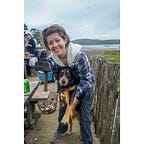Four Resume Tips for Transitioning from Civil Engineering to Data Science
Reframing your civil engineering experience for a role in analytics
I frequently receive friendly messages from fellow civil engineers seeking to switch careers to data science after I posted an article describing how I personally made the switch to data science from civil engineering. Several people have asked how to frame previous civil engineering experience on a resume when applying to data science or analytics jobs. I’ll share the 4 tips I recommend.
Having been on both sides of the interview process now — interviewing and hiring — I’ve learned to pick good interview candidates by skimming through resumes. Things I look for when reviewing resumes include:
- Advanced statistics knowledge
- Proven coding experience in Python or R
- Previous experience on a data science team
- Knowledge of the current best practices in data science
Keeping these core principles in mind, these are the four resume tips I recommend when coming from a civil background. I’ll describe each in more detail below.
- Lead with your education
- Reframe your civil engineering job experience
- Highlight any coding experience
- Fill in the gap with your portfolio
Tip #1. Lead with your education
Demonstrate a strong background in math. If you don’t have at least a Master’s degree in math, science, or engineering, I strongly recommend earning one in data science or statistics (and complete an internship while in the program!). Otherwise, you should consider applying to analytics roles instead. An MS is typically a minimum requirement for data science positions in the San Francisco Bay Area (many candidates have a PhD).
If your degree is not specifically in math, statistics, or physics, I recommend listing the statistics courses you’ve completed. Make it clear that you’ve had training in advanced statistics.
I’ve heard mixed opinions about whether to list data science bootcamps or certificate programs in the education section. I put my data science certificate in a Certifications & Memberships section on my resume. In that same section I listed my P.E. license, the data science meetups I participate in, and that I authored data science articles in the Towards Data Science publication.
Tip #2. Reframe your civil engineering job experience
First off, let’s acknowledge that this part is hard. You’re smart, motivated, and a creative problem solver — that’s how you successfully became a civil engineer! However, set that engineering ego aside for this task. HR is not going to consider the ability to design and draft a building foundation using AutoCAD Civil 3D as a technical skill. You’ll need to reframe this technical experience into something a recruiter can classify as “useful”. My recommendation is to describe your engineering experience as analytics-related or use it to highlight a soft skill.
Here are a few examples:
- Engineering reports: The ability to write technical reports demonstrates you can document your technical work and communicate technical concepts. These are important skills in data science.
- Excel work: Engineers love spreadsheets. Data scientists abhor them (a terrible place to store data!). Despite these differences of opinion, list any relevant technical problems you solved in Excel. For example, an optimization problem solved programmatically or a VBA program that performs data transformations. Highlight the task itself, not the fact that you are an Excel wizard.
- Plots: Business leaders love effective data visualizations. Highlight the fact that you can create effective data visualizations that have been used to inform business decisions.
- Design calculations: Typically, engineering calculations have an optimization problem or applied statistics at the root of them. Describe the design calculations as solving a complex mathematical problem. In my case, the hydrologic modeling I’d performed was an example of both applied statistics (what is the 100-year storm event based on historical data) and optimization (what’s the optimal infrastructure design given a volume of inflowing and infiltrating stormwater over a period of time).
Construction management: Creating workflow processes, staying organized, project planning. Important soft skills worth highlighting! Side note: if you come from a background in project management, consider learning Agile product management and entering the data science field as a product manager for data science teams.
Tip #3. Highlight any coding experience
One of the primary things your resume should convey is your Python, R, and SQL knowledge. This should be demonstrated on your personal GitHub page, which your resume should include a link to. If you don’t have a GitHub page, you need to create one and regularly contribute to it.
Aside from your experience with these primary data science languages, on-the-job coding experience is also worth listing (regardless of the language). On-the-job coding experience in the civil engineering industry is typically performed within a software platform (Excel, Access, ArcGIS) or in more research-oriented programming languages like MATLAB. Did you use SQL to query data in MS Access? Mention it! Did you utilize Python to spatially analyze data in ArcGIS? Mention it!
Tip #4. Fill in the gap with your portfolio
Your data science project portfolio should fill in any gaps between your job experience and the job description for the position you’re applying for. Include a link to the GitHub code. Include any data science volunteer work, research work, or perhaps a capstone project. State the goal of the project, data science skills used (i.e. the coding language, packages, and machine learning algorithm), and the outcome of the project (include metrics, if possible).
Here are a couple examples from one of my old resumes:
In summary, be disciplined about making your resume relevant to each job you’re applying for. That civil engineering experience can be useful if you can frame it to demonstrate analytics experience or to highlight soft skills. Build a portfolio of projects that demonstrate your stellar data science skills not listed in your job experience. When you’re ready to prepare for technical interviews, check out my article on data science interviews. You can do it!
